15 start with U start with U
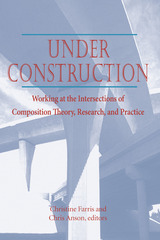
Few composition scholars two decades ago would have imagined the rate at which their field is now developing, expanding beyond its boundaries, creating new alliances, and locating new sites for research and generation of knowledge. In their introduction to this volume, Farris and Anson argue that, faced with a welter of competing models, compositionists too quickly dichotomize and dismiss.
The contributors to Under Construction, therefore, address themselves to the need for commerce among competing visions of the field. They represent diverse settings and distinct points of view, but their over-riding interest is in promoting a view of the field that values interaction and mutual development above dogmatics and isolation.
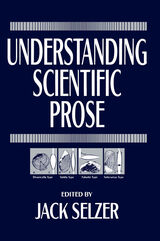
Examining science as a rhetorical enterprise, this book seizes upon one scientific essay—"The Spandrels of San Marco and the Panglossian Paradigm: A Critique of the Adaptationist Programme"—and probes it from many angles. Written by prominent evolutionary theorists Stephen Jay Gould and Richard C. Lewontin and first published in the Proceedings of the Royal Society of London in 1979, the "Spandrels" article is both serious science and vivid prose. Applying methods inspired by Louis Althusser, Michel Foucault, Jacques Derrida, Ferdinand de Saussure, and others, the contributors employ a range of interpretive strategies. Stephen Jay Gould adds his own comments, and the full text of the essay "Spandrels" is reproduced as an appendix. Applying methods inspired by Louis Althusser, Michel Foucault, Jacques Derrida, Ferdinand de Saussure, and others, the contributors employ a range of interpretive strategies. Stephen Jay Gould adds his own comments, and the full text of the essay "Spandrels" is reproduced as an appendix.
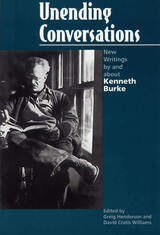
Previously unpublished writings by and about Kenneth Burke plus essays by such Burkean luminaries as Wayne C. Booth, William H. Rueckert, Robert Wess, Thomas Carmichael, and Michael Feehan make the publication of Unending Conversations a significant event in the field of Burke studies and in the wider field of literary criticism and theory.
Editors Greig Henderson and David Cratis Williams have divided their material into three parts: “Dialectics of Expression, Communication, and Transcendence,” “Criticism, Symbolicity, and Tropology,” and “Transcendence and the Theological Motive.”
In the first part, Williams’s textual introduction and Rueckert’s essay analyze the genesis and composition of Burke’s A Symbolic of Motives and Poetics, Dramatistically Considered. Henderson opens part two by showing how these two essays’ concerns with literary form hearken back to Burke’s first book of criticism, Counter-Statement.
Thomas Carmichael discusses Burke’s relationship to thinkers such as Paul de Man, Jacques Derrida, Stanley Fish, Fredric Jameson, Jean-François Lyotard, and Richard Rorty. Wess analyzes the relation between Burke’s dramatistic pentad of act, agent, scene, agency, and purpose and his four master tropes—metaphor, metonymy, synecdoche, and irony.
In the third part, Booth mines his unpublished correspondence with Burke to demonstrate that Burke is a coy theologian. Michael Feehan discusses Burke’s revelation in a 1983 interview that rather than rebounding from a naive kind of Marxism in Permanence and Change, he was rebounding from what he had “learned as a Christian Scientist.”
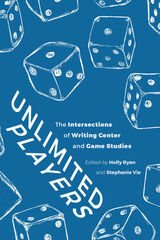
The collection opens with theoretically driven chapters that approach writing center work through the lens of games and play. These chapters cover a range of topics, including considerations of identity, empathy, and power; productive language play during tutoring sessions; and writing center heuristics. The last section of the book includes games, written in the form of tabletop game directions, that directors can use for staff development or tutors can play with writers to help them develop their skills and practices.
No other text offers a theoretical and practical approach to theorizing and using games in the writing center. Unlimited Players provides a new perspective on the long-standing challenges facing writing center scholars and offers insight into the complex questions raised in issues of multimodality, emerging technologies, tutor education, identity construction, and many more. It will be significant to writing center directors and administrators and those who teach tutor training courses.
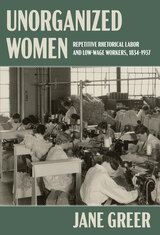
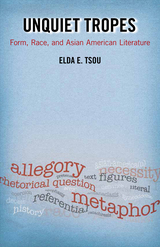
In Unquiet Tropes, Tsou reconceptualizes the literature as a set of highly particular classical rhetorical tropes including antanaclasis, rhetorical question, apophasis, catachresis, and allegory. Looking at five canonical works—Aiiieeeee!, No-No Boy, China Men, Blu’s Hanging, and Native Speaker—Tsou shows how these texts use figurative means to confront the problem of race. She also explores how traces of Asian American history live on through these figures.
Each case study in Unquiet Tropes considers a different scenario—defiance, coercion, necessity, error, and deceit—to show how literary representation from the 1950s through 1997 has responded to a specific political condition.
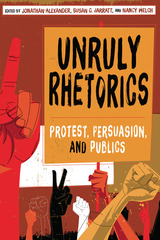
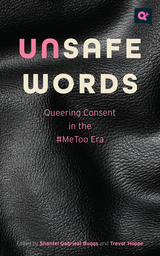
Telling a queerer side of the #MeToo story, Unsafe Words dares to challenge dogmatic assumptions about sex and consent while developing tools and language to promote more ethical and more pleasurable sex for everyone.
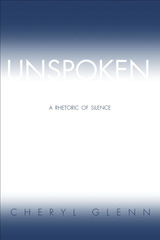
In our talkative Western culture, speech is synonymous with authority and influence while silence is frequently misheard as passive agreement when it often signifies much more. In her groundbreaking exploration of silence as a significant rhetorical art, Cheryl Glenn articulates the ways in which tactical silence can be as expressive and strategic an instrument of human communication as speech itself.
Drawing from linguistics, phenomenology, feminist studies, anthropology, ethnic studies, and literary analysis, Unspoken: A Rhetoric of Silence theorizes both a cartography and grammar of silence. By mapping the range of spaces silence inhabits, Glenn offers a new interpretation of its complex variations and uses.
Glenn contextualizes the rhetoric of silence by focusing on selected contemporary examples. Listening to silence and voice as gendered positions, she analyzes the highly politicized silences and words of a procession of figures she refers to as “all the President’s women,” including Anita Hill, Lani Guiner, Gennifer Flowers, and Chelsea Clinton. She also turns an investigative ear to the cultural taciturnity attributed to various Native American groups—Navajo, Apache, Hopi, and Pueblo—and its true meaning. Through these examples, Glenn reinforces the rhetorical contributions of the unspoken, codifying silence as a rhetorical device with the potential to deploy, defer, and defeat power.
Unspoken concludes by suggesting opportunities for further research into silence and silencing, including music, religion, deaf communities, cross-cultural communication, and the circulation of silence as a creative resource within the college classroom and for college writers.
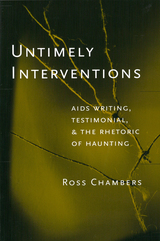
Ross Chambers argues that culture produces itself as civilized by denying the forms of collective violence and other traumatic experience that it cannot control. In the context of such denial, personal accounts of collective disaster can function as a form of counter-denial. By investigating a range of writing on AIDS, the First World War, and the Holocaust, Chambers shows how such writing produces a rhetorical effect of haunting, as it seeks to describe the reality of those experiences culture renders unspeakable.
Ross Chambers is Professor of Romance Languages at the University of Michigan. His other books includeFacing It: AIDS Diaries and the Death of the Author.
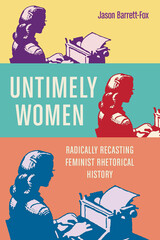
Untimely Women recovers the work of three early-twentieth-century working women, none of whom history has understood as feminists or rhetors: cinema icon and memoirist, Mae West; silent film screenwriter and novelist, Anita Loos; and journalist and mega-publisher, Marcet Haldeman-Julius. While contemporary scholarship tends to highlight and recover women who most resemble academic feminists in their uses of propositional rhetoric, Jason Barrett-Fox uses what he terms a medio-materialist historiography to emphasize the different kinds of political and ontological gender-power that emerged from the inscriptional strategies these women employed to navigate and critique male gatekeepers––from movie stars to directors to editors to abusive husbands.
In recasting the work of West, Loos, and Haldeman-Julius in this way, Barrett-Fox reveals the material and ontological ramifications of their forms of invention, particularly their ability to tell trauma in ways that reach beyond their time to raise the consciousness of audiences unavailable to them in their lifetimes. Untimely Women thus accomplishes important historical and rhetorical work that not only brings together feminist historiography, rhetorical materialism, and posthumanism but also redefines what counts as feminist rhetoric.
With the advent of easy-to-use websites, ordinary people have become internet writers, disseminating their texts to large audiences. Social media sites enable writers’ audiences to communicate back to the them, instantly and often. Even professional writers work within interfaces that place comments adjacent to their text, privileging the audience’s voice. Thus, writers face the prospect of attending to their writing after they deliver their initial arguments. Update Culture and the Afterlife of Digital Writing describes the conditions that encourage “published” texts to be revisited. It demonstrates—through forty case studies of Amazon reviewers, redditors, and established journalists—how writers consider the timing, attention, and management of their writing under these ever-evolving conditions.
Online culture, from social media to blog posts, requires a responsiveness to readers that is rarely duplicated in print and requires writers to consistently reread, edit, and update texts, a process often invisible to readers. This book takes questions of circulation online and shows, via interviews with both writers and participatory audience members, that writing studies must contend with writing’s afterlife. It will be of interest to researchers, scholars, and students of writing studies and the fields of rhetoric, communication, education, technical communication, digital writing, and social media, as well as all content creators interested in learning how to create more effective posts, comments, replies, and reviews.
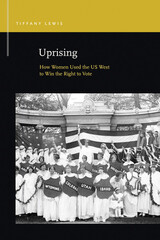
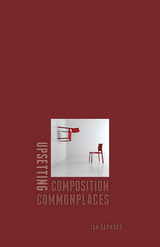
In Upsetting Composition Commonplaces, Ian Barnard argues that composition still retains the bulk of instructional practices that were used in the decades before poststructuralist theory discredited them. While acknowledging that some of the foundational insights of poststructuralist theory can be difficult to translate to the classroom, Barnard upends several especially intransigent tenets that continue to influence the teaching of writing and how students are encouraged to understand writing.
Using six major principles of writing classrooms and textbooks—clarity, intent, voice, ethnography, audience, and objectivity—Barnard looks at the implications of poststructuralist theory for pedagogy. While suggesting some evocative poststructuralist pedagogical practices, the author focuses on diagnosing the fault lines of composition's refusal of poststructuralism rather than on providing "solutions” in the form of teaching templates.
Upsetting Composition Commonplaces addresses the need to more effectively engage in poststructuralist concepts in composition in an accessible and engaging voice that will advance the conversation about relations between the theory and teaching of writing.
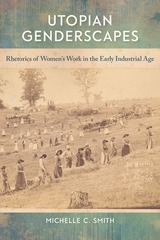
A necessary rhetorical history of women’s work in utopian communities
Utopian Genderscapes focuses on three prominent yet understudied intentional communities—Brook Farm, Harmony Society, and the Oneida Community—who in response to industrialization experimented with radical social reform in the antebellum United States. Foremost among the avenues of reform was the place and substance of women’s work. Author Michelle C. Smith seeks in the communities’ rhetorics of teleology, choice, and exceptionalism the lived consequences of the communities' lofty goals for women members.
This feminist history captures the utopian reconfiguration of women’s bodies, spaces, objects, and discourses and delivers a needed intervention into how rhetorical gendering interacts with other race and class identities. The attention to each community’s material practices reveals a gendered ecology, which in many ways squared unevenly with utopian claims. Nevertheless, this volume argues that this utopian moment inaugurated many of the norms and practices of labor that continue to structure women’s lives and opportunities today: the rise of the factory, the shift of labor from home spaces to workplaces, the invention of housework, the role of birth control and childcare, the question of wages, and the feminization of particular kinds of labor.
An impressive and diverse array of archival and material research grounds each chapter’s examination of women’s professional, domestic, or reproductive labor in a particular community. Fleeting though they may seem, the practices and lives of those intentional women, Smith argues, pattern contemporary divisions of work along the vibrant and contentious lines of gender, race, and class and stage the continued search for what is possible.
READERS
Browse our collection.
PUBLISHERS
See BiblioVault's publisher services.
STUDENT SERVICES
Files for college accessibility offices.
UChicago Accessibility Resources
home | accessibility | search | about | contact us
BiblioVault ® 2001 - 2024
The University of Chicago Press









